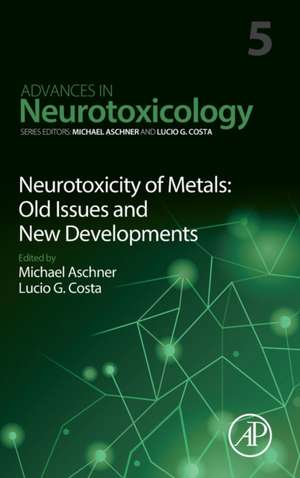Neurotoxicity of Metals: Old Issues and New Developments: Advances in Neurotoxicology, cartea 5
Michael Aschner, Lucio G. Costaen Limba Engleză Hardback – 18 apr 2021
- Provides the authority and expertise of leading contributors from an international board of authors
- Presents the latest release in the Advances in Neurotoxicology series
- Updated release includes the latest information on the mechanisms associated with neurodegeneration, neurodevelopmental effects, and brain accumulation of metals
- New approaches for the study of metal neurotoxicity
| Toate formatele și edițiile | Preț | Express |
|---|---|---|
| Paperback (1) | 791.85 lei 38-44 zile | |
| Springer International Publishing – 18 aug 2018 | 791.85 lei 38-44 zile | |
| Hardback (2) | 874.06 lei 36-50 zile | |
| ELSEVIER SCIENCE – 18 apr 2021 | 874.06 lei 36-50 zile | |
| Springer International Publishing – 18 sep 2017 | 955.08 lei 43-57 zile |
Preț: 874.06 lei
Preț vechi: 1213.47 lei
-28% Nou
Puncte Express: 1311
Preț estimativ în valută:
167.27€ • 173.99$ • 138.09£
167.27€ • 173.99$ • 138.09£
Carte tipărită la comandă
Livrare economică 07-21 aprilie
Preluare comenzi: 021 569.72.76
Specificații
ISBN-13: 9780128237755
ISBN-10: 0128237759
Pagini: 378
Dimensiuni: 152 x 229 mm
Greutate: 0.68 kg
Editura: ELSEVIER SCIENCE
Seria Advances in Neurotoxicology
ISBN-10: 0128237759
Pagini: 378
Dimensiuni: 152 x 229 mm
Greutate: 0.68 kg
Editura: ELSEVIER SCIENCE
Seria Advances in Neurotoxicology
Public țintă
Faculty, students, risk assessors, federal employees, industry scientistsCuprins
1. Molecular mechanisms of aluminum neurotoxicity: Update on adverse effects and therapeutic strategies
Anatoly V. Skalny, Michael Aschner, Yueming Jiang , Yordanka G. Gluhcheva, Yousef Tizabi, Ryszard Lobinski and Alexey A. Tinkov
2. Arsenic-mediated developmental neurotoxicity: Recent advances in understanding the adverse outcomes and underlying mechanisms
Stefan Masjosthusmann, Julia Tigges, Ellen Fritsche and Katharina Koch
3. Cadmium neurotoxicity: From its analytical aspects to neuronal impairment
Jamile Fabbrin Gonçalves, Valderi Luiz Dressler, Charles Elias Assmann, Vera Maria Melchiors Morsch and Maria Rosa Chitolina Schetinger
4. Neurotoxicity of copper and copper nanoparticles
Arundhati Joshi, Kathrin Farber and Ivo F. Scheiber
5. Molecular mechanisms of lead neurotoxicity
Miriam B. Virgolini and Michael Aschner
6. Neurotoxicity mechanisms of manganese in the central nervous system
Edward Pajarillo, Ivan Nyarko-Danquah, Getinet Adinew, Asha Rizor, Michael Aschner and Eunsook Lee
7. Neurotoxicity of mercury: An old issue with contemporary significance
Vasco Branco, Michael Aschner and Cristina Carvalho
8. Neurotoxicity of nickel
Omamuyovwi M. Ijomone
9. Neurotoxicity of thallium: Old issues and new developments
Laura Osorio-Rico, Abel Santamaría, Syed F. Ali and Sonia Galván-Arzate
10. Neurotoxicity of vanadium
FA Olaolorun, FE Olopade, IL Usende, AD Lijoka, AD Ladagu and JO Olopade
11. Neurotoxicity of metal mixtures
Lopes de Andrade, Vanda, Marreilha dos Santos, Ana Paula and Aschner, Michael
Anatoly V. Skalny, Michael Aschner, Yueming Jiang , Yordanka G. Gluhcheva, Yousef Tizabi, Ryszard Lobinski and Alexey A. Tinkov
2. Arsenic-mediated developmental neurotoxicity: Recent advances in understanding the adverse outcomes and underlying mechanisms
Stefan Masjosthusmann, Julia Tigges, Ellen Fritsche and Katharina Koch
3. Cadmium neurotoxicity: From its analytical aspects to neuronal impairment
Jamile Fabbrin Gonçalves, Valderi Luiz Dressler, Charles Elias Assmann, Vera Maria Melchiors Morsch and Maria Rosa Chitolina Schetinger
4. Neurotoxicity of copper and copper nanoparticles
Arundhati Joshi, Kathrin Farber and Ivo F. Scheiber
5. Molecular mechanisms of lead neurotoxicity
Miriam B. Virgolini and Michael Aschner
6. Neurotoxicity mechanisms of manganese in the central nervous system
Edward Pajarillo, Ivan Nyarko-Danquah, Getinet Adinew, Asha Rizor, Michael Aschner and Eunsook Lee
7. Neurotoxicity of mercury: An old issue with contemporary significance
Vasco Branco, Michael Aschner and Cristina Carvalho
8. Neurotoxicity of nickel
Omamuyovwi M. Ijomone
9. Neurotoxicity of thallium: Old issues and new developments
Laura Osorio-Rico, Abel Santamaría, Syed F. Ali and Sonia Galván-Arzate
10. Neurotoxicity of vanadium
FA Olaolorun, FE Olopade, IL Usende, AD Lijoka, AD Ladagu and JO Olopade
11. Neurotoxicity of metal mixtures
Lopes de Andrade, Vanda, Marreilha dos Santos, Ana Paula and Aschner, Michael
Notă biografică
Michael Aschner is the Gray E. B. Stahlman Professor of Pediatrics and Pharmacology at Vanderbilt University School of Medicine as well as a Senior Investigator at the Kennedy Center for Research on Human Development. Dr Aschner’s research group has a particular interest in the neurobiology and physiology of astrocytes and the signaling mechanisms associated with central nervous system injury. Dr Aschner’s laboratory studies metal uptake and distribution in the brain, investigating the mechanisms of transport of methylmercury and manganese across the capillaries of the blood–brain barrier. His research utilizes various experimental models (C. elegans, tissue cultures and rodents) to understand the acute toxicity of manganese deposition in the brains of human neonates.
Lucio G. Costa is Professor of Environmental and Occupational Health Sciences at the School of Public Health at the University of Washington. Dr. Costa is a renowned neurotoxicologist whose research interests are focused on understanding the role of neurotoxic substances in neurodevelopmental disorders and other neurological, neuropsychiatric and neurodegenerative diseases. Dr Costa’s research laboratory makes use of a variety of in vivo and in vitro cell culture systems, transgenic animal models and imaging techniques to study the cellular, biochemical and molecular mechanisms of neurotoxicity.
Textul de pe ultima copertă
In this book, international authorities address contemporary research in metal neurotoxicity. Essential and non-essential metals play an important role in neurodevelopmental and neurodegenerative diseases. Recent developments in understanding the role of metals in the etiology of these disorders have led to rapid growth in clarifying the pathology of some of the most devastating diseases we face and in identifying potential new therapies. Few books or periodicals have been wholly dedicated to the topic of metals, and this collection is intended to serve as a resource for all researchers interested in metals and their role in health and disease.
Caracteristici
Comprehensive overview of metal neurotoxicity Contributions from international authorities on the subject Discusses a wide range of essential and non-essential metals Includes supplementary material: sn.pub/extras










